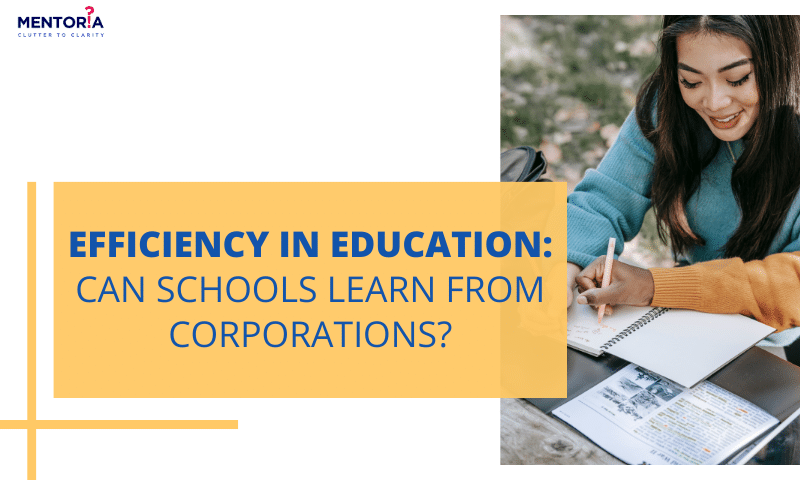Efficiency In Education: Can Schools Learn From Corporations?

Imagine a school where the principal greets you with a firm handshake and a crisp suit, teachers present PowerPoint slides filled with pie charts and graphs, and the lunch menu boasts a line-up of efficiency-driven meal options. It’s a school, but it feels like a boardroom meeting. Welcome to the world where schools run like corporations, where the ABCs of business management meet the 123s of education. The idea might sound as exciting as a maths test on a Friday night, or it could be the refreshing splash of innovation that our schools need. In this blog, we’ll dive headfirst into this captivating concept: Can schools truly run like corporations, and would such an approach revolutionise our education system? Let’s explore the intriguing journey of marrying the efficiency of the corporate world with the nurturing environment of schools.
The Corporate Efficiency Model
In the corporate world, efficiency is the name of the game. Companies strive to maximise productivity, minimise waste, and achieve their goals swiftly and effectively. But how does this relate to education? Well, let’s take a closer look at how schools can draw inspiration from the corporate world.
Data-Driven Decision Making
- The Corporate Side: Businesses thrive on data-driven decision-making. They analyse customer preferences, market trends, and financial data to make informed choices. For instance, Amazon uses customer data to recommend products, enhancing the shopping experience.
- Education’s Takeaway: Schools can apply a similar approach by leveraging data to tailor teaching methods to individual students’ needs. Adaptive learning software and analytics can help educators identify areas where students may struggle, allowing for personalised interventions. A real-world example is DreamBox, an adaptive maths programme that has shown significant improvements in student performance.
Lean Management
- The Corporate Side: Lean management principles, inspired by Toyota, focus on eliminating waste and inefficiency. Corporations regularly review processes to cut unnecessary steps and optimise resources.
- Education’s Takeaway: Schools can implement lean management by streamlining administrative tasks, reducing paperwork, and automating routine processes. A case study comes from the Knowledge is Power Programme (KIPP), a network of charter schools that improved operational efficiency by adopting lean principles, allowing teachers to focus more on instruction.
Technology Integration
- The Corporate Side: Technology is the driving force behind many corporate success stories. Companies like Google leverage technology to enhance collaboration, streamline communication, and facilitate remote work.
- Education’s Takeaway: Schools can harness the power of technology to make learning more engaging and accessible. Platforms like Google Classroom have transformed the way teachers and students interact, allowing for seamless online learning and communication.
Continuous Improvement
- The Corporate Side: Successful businesses are always looking for ways to improve. They gather feedback from customers and employees and use it to refine their products and services.
- Education’s Takeaway: Schools can adopt a similar approach by seeking feedback from both students and educators. By actively listening to their needs and concerns, schools can adapt and evolve to create a better learning environment.
Partnerships and Collaboration
- The Corporate Side: Many corporations thrive by partnering with other organisations. For example, Apple collaborates with app developers to offer a wide range of applications on their devices, enhancing their product’s value.
- Education’s Takeaway: Schools can benefit from partnerships with local businesses, nonprofits, and community organisations. These collaborations can provide resources, mentorship opportunities, and real-world experiences for students. An excellent example is the IBM P-TECH programme, which partners with schools to offer students both a high school diploma and an associate degree.
Challenges on the Path to Efficiency
While drawing inspiration from the corporate world is promising, it’s essential to acknowledge that education has its unique challenges.
- Personalised Learning vs. Standardisation: One significant challenge is striking the right balance between personalised learning and standardised curriculum. While personalisation is vital, standardised testing is often necessary to evaluate students’ progress on a broader scale.
- Equity and Access: Not all students have equal access to technology or additional resources. Ensuring that efficiency efforts don’t exacerbate educational inequalities is crucial.
- Teacher Autonomy: Teachers play a pivotal role in education. It’s vital to ensure that efficiency measures don’t stifle their creativity and autonomy in the classroom.
A Brighter Future for Education
As we explore the possibilities of enhancing efficiency in education, it’s essential to remember that education’s primary goal is not just to produce efficient learners but well-rounded individuals ready to tackle the challenges of the world. Therefore, any efficiency measures must align with this overarching purpose.
By taking a page from the corporate playbook, schools can find ways to operate more efficiently while preserving the core values of education. It’s an exciting journey with the potential to make a profound impact on how we learn and grow as a society.
So, whether you’re a student, a parent, or an educator, let’s embrace this evolving landscape of education and work together to create a brighter, more efficient future for the generations to come. After all, learning is a lifelong adventure, and we’re all in it together!
Striking A Balance For Success With Mentoria
Striking the right balance between efficient administration and a holistic educational experience is the key to success. Schools can benefit from corporate practices in areas like resource management, technology adoption, and data analytics while preserving the core values of education and the well-being of all stakeholders.
Mentoria understands the complexities of the education sector and the challenges that educational institutions face in balancing efficiency and quality. Our team of experienced education consultants can provide guidance on optimising administrative processes, implementing modern technologies, and fostering an environment that nurtures both academic and personal growth.
If you’re an educator or administrator looking to enhance the efficiency of your school while maintaining a focus on education quality, Mentoria is here to assist. Our tailored solutions and expertise can help you navigate the unique challenges of the education sector and lead your institution towards a successful future.









